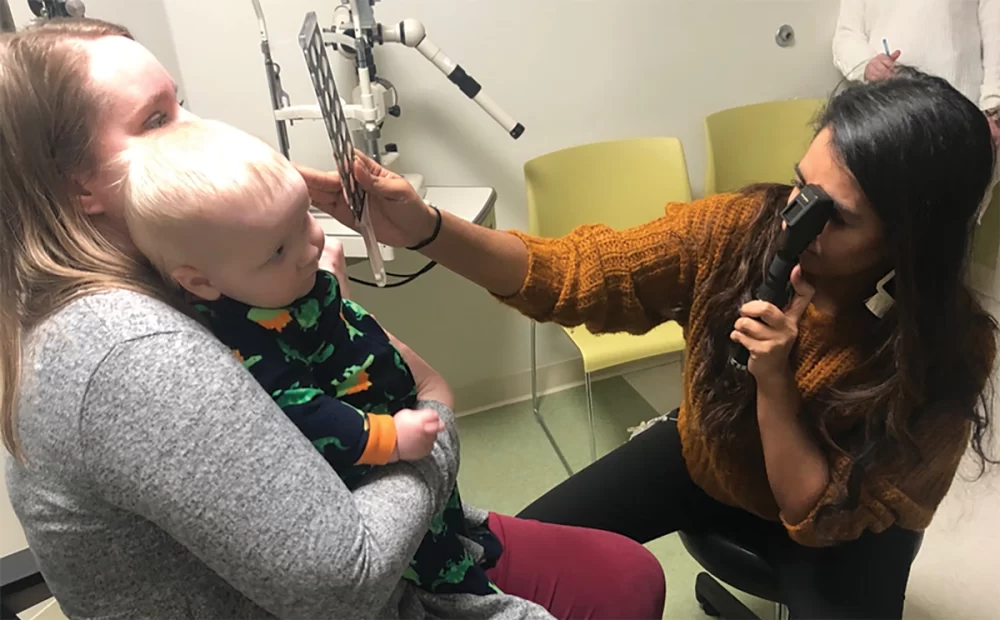
- Why Pediatric Eye Care Matters
- Key Qualities to Look for in a Pediatric Optometrist
- Steps to Find the Right Children’s Eye Doctor
- Common Challenges in Kids’ Eye Care and How Specialists Help
- Real-Life Case Study of Finding a Pediatric Optometrist
- Why Choose Eye Docs for Pediatric Eye Care Services
1. Why Pediatric Eye Care Matters
When it comes to children’s health, vision is often overlooked despite being crucial for development. Pediatric eye care is a specialized branch of optometry focused on diagnosing, treating, and managing eye conditions in children from infancy through adolescence. Unlike adults, children’s eyes are still developing, which means early detection of vision problems can prevent long-term issues such as amblyopia (lazy eye), strabismus (crossed eyes), or even more severe visual impairments.
Parents often wonder how to find an optometrist for pediatric eye care who understands the unique needs of children. Unlike a general optometrist, pediatric eye doctors use child-friendly approaches and have expertise in managing behavioral factors that influence successful eye exams in kids. Providing comprehensive vision care early on supports children’s learning and confidence, ensuring they don’t fall behind in school or social settings.
1.1 Importance of Specialized Pediatric Eye Exams
Children rarely complain about vision problems, so routine screenings with a pediatric optometrist are essential. These specialists are trained to conduct exams tailored to young children’s attention spans and communication styles. Through specialized testing, they can detect subtle issues that might be missed in a general eye exam, giving parents peace of mind.
1.2 Long-Term Benefits of Early Vision Care
Addressing eye health in childhood can have lifelong benefits. For instance, catching and correcting vision problems early reduces the risk of permanent vision loss and supports overall brain development linked to sight. Schools and educators often collaborate with pediatric optometrists to create supportive learning environments for children with vision difficulties.
2. Key Qualities to Look for in a Pediatric Optometrist
Knowing what to look for can make the search for a children’s eye doctor less overwhelming. Here are the essential qualities that a reputable pediatric optometrist should have:
2.1 Professional Credentials and Experience
Ensure the optometrist is licensed and has additional training or certification in pediatric eye care. Experience with children, especially those with developmental delays or special needs, is a significant advantage.
2.2 Child-Friendly Approach and Environment
Visits to the eye doctor can be intimidating for kids. A good pediatric optometrist uses techniques that ease anxiety, like colorful exam rooms, toys, or interactive equipment. Their communication style should be gentle, patient, and encouraging.
2.3 Comprehensive Services and Technology
Look for clinics that offer a full range of pediatric vision services, from routine eye exams to treatment of complex eye conditions. Advanced diagnostic tools improve accuracy and comfort during exams.
3. Steps to Find the Right Children’s Eye Doctor
Finding a trusted optometrist for pediatric eye care is a process that involves several strategic steps:
3.1 Start with Recommendations
Ask your pediatrician, friends, or school nurses for referrals. Hearing personal experiences can help identify trustworthy providers.
3.2 Research and Verify Credentials
Check the optometrist’s qualifications, reviews, and whether they specialize in pediatric care. Many professional organizations list certified pediatric optometrists.
3.3 Visit the Clinic in Person
Assess the environment to see if it’s welcoming for children. Ask questions about their approach to pediatric care, exam procedures, and insurance coverage.
3.4 Consider Accessibility and Follow-Up Care
Choose a provider located conveniently for your family and one who offers consistent follow-up and emergency services, as pediatric vision care often requires monitoring.
4. Common Challenges in Kids’ Eye Care and How Specialists Help
Children can present unique challenges in eye care, such as difficulty staying still, limited communication, or fear of doctors. Pediatric optometrists are trained to manage these obstacles with patience and skill.
4.1 Behavioral Challenges During Exams
Specialists often use distraction techniques and positive reinforcement to complete thorough exams. Their experience allows them to read non-verbal cues and adapt quickly.
4.2 Managing Complex Conditions
Some children require specialized treatment plans involving glasses, patching, or vision therapy. Pediatric optometrists coordinate with parents and other healthcare providers to tailor care effectively.
5. Real-Life Case Study of Finding a Pediatric Optometrist
Consider the story of Emily, a mother who noticed her 4-year-old son struggling to recognize letters and becoming easily frustrated during reading time. After consulting their pediatrician, Emily sought out a pediatric eye doctor and found a trusted optometrist through recommendations and clinic visits.
The optometrist identified early signs of amblyopia and prescribed corrective lenses combined with patch therapy. Thanks to early intervention and the child-friendly approach of the pediatric optometrist, Emily’s son’s vision improved significantly within months, and his confidence in school soared.
This example highlights the importance of knowing how to find an optometrist for pediatric eye care who can provide attentive, expert service tailored to children’s needs.
6. Why Choose Eye Docs for Pediatric Eye Care Services
When searching for reliable pediatric vision care, Eye Docs stands out by offering a wide range of specialized services designed specifically for children. Our team includes highly trained pediatric optometrists who combine advanced technology with compassionate care to make every visit comfortable and effective.
Whether you’re starting routine check-ups or addressing a specific eye condition, Eye Docs is a trusted resource where families can find personalized recommendations, quality eyewear, and professional guidance all in one place. Choosing Eye Docs ensures your child receives the best care to support healthy vision development.








